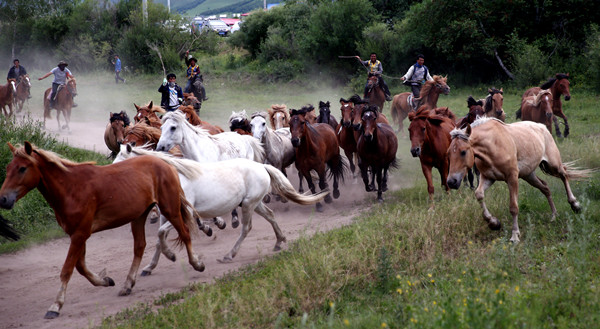Xi notes green push as desert becomes forest
China Daily,August 29, 2017 Adjust font size:
Saihanba buffers sand from cities and becomes major tourist locale
 |
Tourists herd horses with local guides last month on a trail in Saihanba National Forest Park. The man-made forest, grown out of the desert and known for its ecotourism in Hebei province, shields Beijing and other big cities from sandstorms. ZOU HONG/CHINA DAILY |
President Xi Jinping has stressed ongoing efforts in building an ecological civilization by adhering to green development concepts.
Xi, also general secretary of the Communist Party of China Central Committee, made the remark in an instruction on the achievements of the man-made Saihanba Forest Farm in Hebei province.
Efforts to pursue green development and an ecological civilization should be made generation by generation to create harmony between people and nature and leave a better environment for future generations, Xi said.
These instructions were passed down at a seminar on Monday in Beijing about how to learn from the Saihanba experience. The seminar was presided over by Liu Qibao, head of the Publicity Department of the CPC Central Committee.
The Saihanba Forest Farm, just 150 kilometers from Beijing, has managed within 55 years to form a natural barrier between the capital and sandstorms that blow in from the north, increasing forest coverage in the area from 12 percent in 1962 to 80 percent in 2016, data from the farm showed.
The largest man-made forest in China has supplied 137 million cubic meters of clean water to nature around the Beijing and Tianjin areas annually, and the annual amount of oxygen discharged from the forest is about 550,000 metric tons, making it important for the capital and its neighbors.
After the reports beginning in July on the transformation from a wasteland into a forest, Saihanba has attracted an increasing number of tourists from home and abroad.
"It's a miracle that such a lush and beautiful forest park was transformed from a wasteland," said Wang Yulong, a tourist visiting Saihanba National Forest Park from Xi'an in Shaanxi province.
Wang and his family drove to Chengde in early August to visit a famous scenic spot-the Chengde Imperial Summer Resort, about 180 kilometers from Saihanba.
"We didn't plan to visit Saihanba, but changed our minds when we heard from many media reports that a vast forest nearby was totally man-made, with efforts spanning more than five decades," Wang said.
During the 55 years, three generations of foresters kept planting trees in the area, where temperatures could drop to -43 C in winter.
Many tourists like Wang traveled from across the country as well as from abroad. Between Jan1 and Aug 19, more than 355,000 tourists visited Saihanba, 13,000 more than the same period a year earlier, according to Tian Yawei, the office director of a company promoting Saihanba tourism.
Tian said the increase mainly came from the tourism boom the past two months.
These visitors also included people who want to learn more about how the forest was created and to be inspired by the spirit of foresters in Saihanba.
Cai Xingbo, general manger of Jianlong Mining Co Ltd in Kuancheng county, Chengde, said he decided to close his mining business after a recent visit to Saihanba and plans to restore mountains in his hometown to develop ecological tourism, such as planting fruit trees.
"As long as we have faith and persistence, we can restore bare mountains with the help of modern technologies," Cai said, adding that the spirit originated from Saihanba has inspired him.